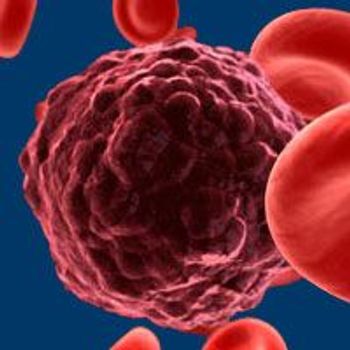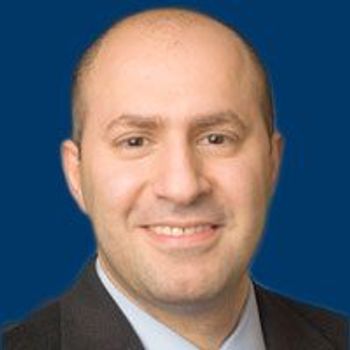Articles by Jason M. Broderick

The FDA issued a historic approval of the first chimeric antigen receptor (CAR) T-cell therapy, authorizing the use of tisagenlecleucel (Kymriah) for the treatment of patients up to 25 years of age with B-cell precursor acute lymphoblastic leukemia that is refractory or in second or later relapse.

The FDA has granted a priority review designation to sunitinib (Sutent) for use as an adjuvant therapy in patients with renal cell carcinoma who have received nephrectomy and are high risk for recurrence.

The FDA has granted a breakthrough therapy designation to tisagenlecleucel-T (CTL019) for use as a treatment for adult patients with relapsed/refractory diffuse large B-cell lymphoma after the failure of at least 2 prior therapies.

The EMA’s Committee for Medicinal Products for Human Use has recommended approval of nivolumab for the treatment of patients with squamous cell cancer of the head and neck following progression on platinum-based therapy.

The European Commission has expanded the indication for lenalidomide (Revlimid) to include use as a maintenance therapy for patients with multiple myeloma following autologous hematopoietic stem cell transplant.

The FDA has approved lenalidomide (Revlimid) as a maintenance therapy for patients with multiple myeloma following autologous hematopoietic stem cell transplant.

The EMA’s Committee for Medicinal Products for Human Use has recommended approval of lenalidomide as a maintenance therapy following autologous stem cell transplant for patients with newly diagnosed multiple myeloma.

JCAR017 has received an FDA breakthrough therapy designation for the treatment of patients with relapsed/refractory, aggressive large B-cell non-Hodgkin lymphoma.

Anti-CD22 chimeric antigen receptor (CAR) T-cell therapy induced an 80% complete remission rate among children and young adults with relapsed/refractory B-cell acute lymphoblastic leukemia, many of whom had prior anti-CD19 CAR T-cell therapy.

For a second time, a clinical hold has been placed on the phase II ROCKET study exploring the CD19-targeted CAR T-cell therapy JCAR015 for adult patients with relapsed or refractory B cell acute lymphoblastic leukemia.

Brentuximab vedotin (Adcetris) has received an FDA breakthrough therapy designation for the treatment of patients with CD30-positive mycosis fungoides or primary cutaneous anaplastic large cell lymphoma following at least 1 prior systemic therapy.

The FDA has approved nivolumab for patients with metastatic or recurrent squamous cell carcinoma of the head and neck following progression on platinum-based therapy.

The FDA has granted a breakthrough therapy designation to alectinib (Alecensa) as a frontline treatment for patients with ALK-positive non–small cell lung cancer.

The European Commission has approved lenvatinib (Kisplyx) in combination with everolimus for patients with advanced renal cell carcinoma following 1 prior VEGF-targeted therapy.

The European Commission has approved cabozantinib for the treatment of patients with advanced renal cell carcinoma after the failure of VEGF-targeted therapy, according to Exelixis and Ipsen, the manufacturers of the multikinase inhibitor.

The FDA has placed a partial clinical hold on a planned pivotal trial examining an investigational T-cell therapy in patients with myxoid round cell liposarcoma.

Cabozantinib (Cabometyx) has received a positive recommendation from the EMA's Committee for Medicinal Products for Human Use for use as treatment for patients with advanced renal cell carcinoma after the failure of VEGF-targeted therapy.

The CD19-targeting CAR T-cell therapy CTL019 induced responses in 53% of patients with relapsed/refractory chronic lymphocytic leukemia, including complete remissions in 35% of patients.

Sunitinib (Sutent) extended disease-free survival versus placebo as an adjuvant therapy for patients with renal cell carcinoma at high risk of recurrence in the phase III S-TRAC trial.

The European Commission has approved brentuximab vedotin (Adcetris) for use as a consolidation therapy following autologous stem cell transplantation in patients with CD30-positive Hodgkin lymphoma at risk of relapse or progression.

The EMA's Committee for Medicinal Products for Human Use has granted a positive opinion to brentuximab vedotin (Adcetris) for use as a consolidation therapy following autologous stem cell transplantation in patients with CD30-positive Hodgkin lymphoma at risk of relapse or progression.

The FDA has approved cabozantinib as a treatment for patients with advanced renal cell carcinoma who have received prior antiangiogenic therapy.

The FDA’s Oncologic Drugs Advisory Committee (ODAC) voted 12-1 against the accelerated approval of rociletinib as a treatment for patients with metastatic EGFR T790M–mutated non–small cell lung cancer (NSCLC) who have previously received an EGFR-targeted therapy.

The FDA has approved Captisol-enabled melphalan (Evomela) as a high-dose conditioning treatment for use in patients with multiple myeloma prior to autologous stem cell transplantation, as well as for the palliative treatment of patients with myeloma for whom oral therapy is not appropriate.

An affinity enhanced T-cell therapy has received an FDA breakthrough therapy designation for the treatment of patients with inoperable or metastatic pretreated synovial sarcoma who harbor HLA-A*201, HLA-A*205, or HLA-A*206 alleles and whose tumors express the NY-ESO-1 tumor antigen.

Nivolumab (Opdivo) has received an FDA breakthrough therapy designation for the treatment of patients with advanced renal cell carcinoma.

Cabozantinib (Cometriq) has received a breakthrough therapy designation from the FDA for the treatment of patients with advanced renal cell carcinoma following one prior therapy.

The European Commission has approved the hedgehog inhibitor sonidegib (Odomzo) for the treatment of patients with locally advanced basal cell carcinoma (laBCC) who are not amenable to curative surgery or radiation therapy.

The anti–PD-L1 agent MPDL3280A has received a breakthrough therapy designation from the FDA for PD-L1–positive non–small cell lung cancer that has progressed during or after platinum-based chemotherapy, as well as a targeted therapy for patients with EGFR- or ALK-positive tumors.

Salvage therapy combining the novel heat shock protein 90 inhibitor ganetespib with docetaxel significantly improved overall survival in some patients with non–small cell lung cancer.






















